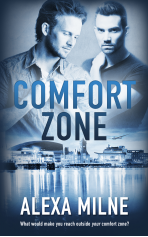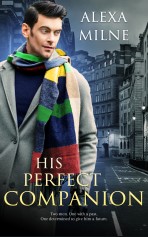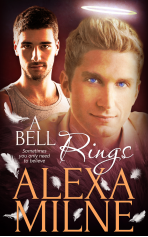Riley tapped his fingers on the wheel of his BMW, glanced first at his watch then up the steps to the door.
“Where the hell is he?” Should he get out and knock on the door? Why did I agree to this? Giving lifts is never wise. Riley already knew the answer. Because his father was my best friend. Because I’m lonely. Because…
The black-painted door flew open and a tall, gangly red-haired youth—in Riley’s eyes—rushed down the steps, attempting to push one arm through a coat sleeve while holding a piece of toast in the other. He stuffed the toast in his mouth, somehow managed the coat then turned around and ran up back up the steps to collect a bag from his mother. He flung open the passenger-side door and jumped in, placing the bag on his lap.
“I’m sorry. I’ve no excuse. I need to take a clock into the shower. I won’t do it again, I promise. Dad’s already torn a strip off me.”
Riley smiled. He’d never admit it to the young man at his side, but timekeeping had never been a strong point of his youth, either. He recalled his father dragging the bedding from over him, then slammed shut the memory.
“Try not to make a habit of it.” He adopted his firm but fair tone, the one he used with clients making impossible demands. Glancing sideways revealed Dylan hadn’t changed much. Always skinny with a head of bright red hair and now matching beard, Dylan had been a smiling toddler when Riley had moved to London and a thin brooding teenager of fifteen when he’d last met him.
“I won’t,” Dylan replied cheerfully to Riley’s admonition. “Should we get off? It’s my first day, and I need to make a good impression.”
Riley turned on the engine and slipped the car out of brake into gear. He checked in all directions and pulled out into the traffic. A light drizzle began, typical weather on the north side of Pendle Hill. The village of his childhood, and his home for the last twelve months, nestled on the side of the hill famous for its witches. He negotiated his way out of the village and onto the motorway. The drizzle turned to rain pattering on the windscreen.
“Thanks for agreeing to give me a lift. I hope it’s not too much of a pain, and I’ll try not to be irritating.”
Riley didn’t reply, hoping to stop the conversation. He was used to quiet journeys accompanied only by the radio or a CD if he felt so inclined. He’d expected Dylan to pull out his mobile, stick in headphones and amuse himself. Dylan, however, didn’t take the hint.
“You doing this is such a relief. I panicked when I got the job, but beggars can’t be choosers these days, and I’m lucky to have one at all. Dad said he’d sort something out for me, and he did, thanks to you. You and him go way back, he told me, but you left to live in London. I remember you visiting a few years back?”
Riley had no chance to reply.
“I’ve only been once, you know, to London. I bet you know all the good places, theaters, restaurants, museums, clubs? I didn’t plan to come back here, but I got the job in Preston, so here I am. Hopefully, I’ll be able move out of home to somewhere nearer, or with a railway station when I’ve saved enough. I went to Durham University, but I expect you know that.”
Riley did, but only because Tony had come to his father’s funeral several months back. The meeting had been awkward. He’d been back six months already at that point, taking care of his father as he gradually faded away. Any guilt he’d felt about not reaching out to his oldest friend had disappeared when Tony hadn’t contacted him, either. He nodded, knowing Dylan would continue.
“I loved Durham, but there weren’t any jobs there. I miss my university friends, but we’re determined to meet up. I bet you got up to all sorts at uni in London.”
Ah, the past. Riley sighed. He’d never be able to stand this onslaught every morning, especially if it came accompanied by twenty questions. Perhaps it wouldn’t be for long. He reached over and turned on the radio, hoping Dylan might get the message without him having to be rude and ask him to shut up.
“Oh, I love this one. You hardly ever hear Living in a Box on the radio.” Dylan proceeded to join in, singing and dancing in his seat.
Did I ever have such energy? Riley felt every one of his forty-two years weighing him down.
Dylan nudged him. “Come on, don’t let the side down. Join in. Didn’t you and Dad used to play this together back in the day?”
Riley couldn’t resist smiling and humming along. How long had it been since he’d played? His guitar lay gathering dust in one of the spare rooms. Dylan had a good voice.
“We did, but how do you know this song?” he asked. “You weren’t even born.”
“I bet you know all the Beatles’ hits,” Dylan replied.
“Yeah, but everyone does, don’t they? My father was a fan. He saw them play at the Cavern Club in Liverpool.” This fact had always surprised him. He couldn’t picture his staid, conservative father in such a venue.
“And so, my dad still plays his stuff from the eighties. They say you never forget the songs you listened to in your early teens. I grew up with his stuff, and…” He leaned forward and whispered, “Don’t tell Mum, but I liked it more than Dylan. She still plays his stuff all the time too.”
Riley chuckled. “I remember her and your father discussing what to call you.”
“And, Mum won. Still, it could be worse. At least she wasn’t an Elvis fan. Can you imagine having to spend your life as Elvis Hargreaves? Do you still play guitar?”
Riley smiled at the memory. Their band hadn’t been anything special but had still played at every school concert, even when he’d moved to the local grammar, due to a music teacher desperate to have acts willing to perform. “I haven’t for a while, but I expect I could strum out a tune. I was never as good as your dad. He played lead. I was the silent, hardly moving bass player.”
“Cool. I play sax. I took music at A level. It always surprises people I did math and music, but they go together somehow—chords, intervals, progression—all math. And I’ve always been good with figures. Some people think accountancy is boring, but I’ve always loved being able to manipulate numbers and see patterns. Music is the same, isn’t it? The best songs use certain intervals between notes to hook you in and chord changes and sequences. If you study it properly, you can see how a song is constructed and pull it apart.”
Riley pressed the accelerator to overtake the lorry on the inside lane. “You know, I’ve never thought about music in that way.” There was certainly more to Dylan than met the eye. “I just like how it sounds. Do you still play sax?”
“For myself, but Mum worries about the neighbors complaining. I might look for a group to join. Not driving is a pain, though. Once I start getting paid, I’m gonna save up for my own car.” He ran his hand over the dashboard. “Nothing like this beauty, though. I bet it even has heated seats. Good to know my arse will be nice and toasty in the winter.”
Riley didn’t want to think about Dylan’s arse, or any other part of him. That part of his life was well and truly over.
“Maybe you and I should get together and play with Dad. Mum still sings, you know, and Kayleigh plays keyboard, though she didn’t get beyond grade five. She hated having to practice, and I doubt she’ll be home from university much. She can’t stand living here.”
“But you’re all right with it?” Riley asked. Over twenty years ago, he’d had the same feelings.
“I guess so, and this way I get my food made and washing done. I know you’re supposed to go to university, have experiences, develop a network and find someone. Well, I found lots of someones, but no one special, and even though I loved Durham, I’ve found I quite like being home too. Mum and Dad are great, and I have my old mates, Matt and Dan. With any luck, I’ll meet new people at work. Are you planning to stay in the village? Dad wasn’t sure, with all the memories. Looking after your father those last months must have been tough.”
“It was.” The last conversation he wanted to have was about watching his father fade away as the cancer took the man who’d always been so strong. He hadn’t decided what to do about the house, but he couldn’t return to his old life. Taking the partnership at his father’s firm now tied him to the area and gave him a reason to get up every day. A face from his past flashed into Riley’s mind. He pushed it away.
“Sorry, sometimes I open my mouth without thinking. Please tell me if I blather on. I’m not good with silence and tend to fill it with words. See, I’m doing it again, babbling on. Feel free to tell me to shut up.”
“It’s fine,” Riley lied. Maybe if he let him, Dylan would get all his words out in one trip. “Truth is I haven’t decided what to do with the house.” He stared into the distance.
“Mr. Ormerod.”
Riley braked harder than he intended, realizing the roundabout at the end of the motorway was coming up. They were both thrown forward. “Sorry about that. And please, call me Riley. My father was Mr. Ormerod.” He pulled up at the first set of lights.
“D’you need me to stop at the town hall? It can sometimes be busy at this time of day. I have a parking space at my office just around the corner. I could drop you off there instead. With your long legs, it shouldn’t take you long.”
“Sounds good to me. Now, what about tonight? I’m supposed to finish at five. Shall I meet you at yours, or hang about outside? I could go to the library if it’s raining, or there’s a café opposite, if you’re going to be late, or as it’s flexitime, I can leave a bit later. Give me your phone, and I’ll put my number in so you can call me.”
This was the bit of the arrangement that had worried Riley as much as the noise, but after several solitary months, Tony’s call out of the blue, asking if he could give his son a lift, had provided him with a lifeline, and Sue, his father’s carer, had encouraged him to take the olive branch.
“Remind me when we get there. I usually try to finish around five, but it depends as some clients can’t get to the office during the day. Most of what I do is paper, not people, but meetings can happen any time.” He pulled up yet again.
“Bugger me, there are a lot of lights on these roads since they made all the changes and pedestrianized the shopping area,” Dylan said. “And cameras everywhere. Dad hates driving in Preston.”
“At least they’ve finished updating the roads around the station and built the new entrance,” Riley agreed. “They’ve made a real effort to improve the place since it got city status, with lots of modern buildings, and it’s such a big university town now—you should feel much more at home. Riley glanced across at Dylan again. He looked much more like Lori than Tony. “You know, it’s funny. Of all the jobs I thought your father might do, I never figured he’d follow your granddad into his shop in Clitheroe. He hated being dragged there when we were young.”
“I guess people change. He loves the place now he sells what he wants. And it turned out he has a nose for an antique. When Granddad had his stroke, Dad took over. He used to take me with him on trips to find new items. You never know when you’ll get a bargain, he’d say. He’s like a pig in muck at a house clearance. He’s at the big auction place in Clitheroe today. By the way, I’m supposed to invite you round for dinner one night or Sunday lunch to say thank you.”
Riley turned into the narrow lane behind the high street then into the car park, grateful not to have to reply. It had been tough and lonely, coming back home and caring for his dying father, a man he’d never been close to. He hadn’t only come back for the man, but for himself, having nowhere else to go.
“We’re here,” he said, pulling up in front of the sign declaring Whewell and Ormerod, Solicitors. “Give me your mobile and we’ll sort out the numbers.” He exchanged numbers and gave Dylan back the phone.
“Ring me when you’re ready,” Dylan said.
Riley tucked the phone into his jacket pocket. “Good luck on your first day.”
“Thanks. I’ll see you later.” Dylan clambered out of the car, threw his bag over his back and hurried off through the narrow back lane between the buildings. Riley sighed. Had he ever been that young? If he had, it was a lifetime ago.
“Bloody hell,” he said, staring in the rear-view mirror. “You’re forty-two, not ninety. Your life is not over.” Willing himself to believe his own words, Riley picked up his briefcase, stepped out of the car and headed for the office with a spring in his step.

























